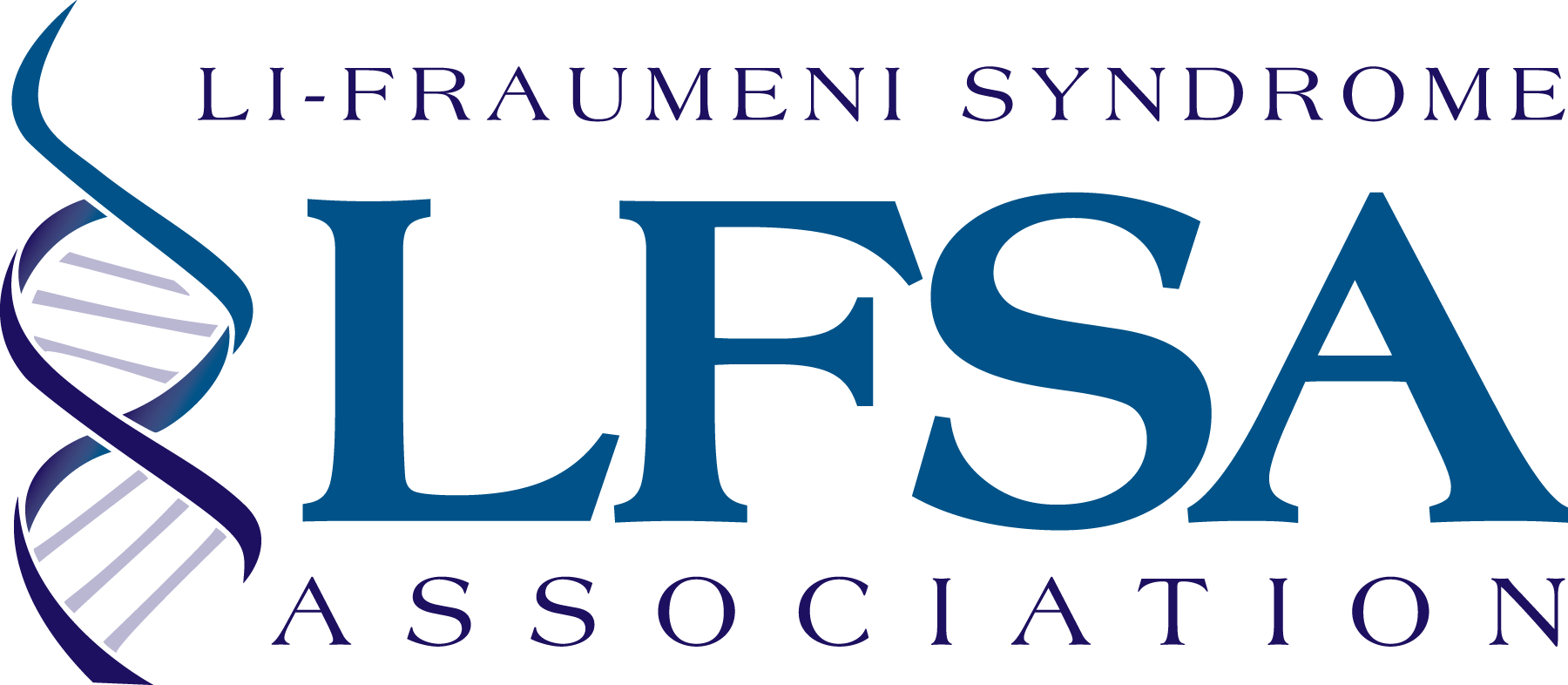It is the mission of the LFSA as a patient advocacy organization to promote an increased understanding of Li-Fraumeni Syndrome (LFS) and foster scientific advancement that will improve the lives of those living with LFS. We have been aided in this endeavor by the recent formation of a LFS Research Consortium. This group is made up of dedicated physicians and scientists from all over the world with an interest in LFS. It is the hope of the LFSA that through our collaborative efforts we can make great progress in the battle against LFS.
Current areas of active research in the National Cancer Institute’s Li-Fraumeni Syndrome Study include:
- Developing better LFS cancer screening protocols for patients living with LFS
- Determining the influences of environmental factors, diet and metabolism on Li-Fraumeni Syndrome
- Identification of modifying genes and epigenetic events that lead to cancer development in LFS
- Utilizing chemoprevention strategies for patients with LFS
If you have LFS, participation in the study could help researchers in the areas of genetic epidemiology, medical management, and living with LFS. Please reference eligibility criteria for additional information.
Current Research Initiatives Supported by LFSA
Characterization of the Adaptive Immune Response to Inherited TP53 Breast Cancers
The LFS Association’s most recent research grant was awarded to Professor Arnie Levine at the Institute for Advanced Studies in honor of Thierry Frébourg. Pr. Levine and his collaborators seek to determine if the immune system is responding to breast cancer in Li-Fraumeni syndrome patients and what type of immune cells may be responding. Knowing the particulars of an immune response in TP53 driven LFS-breast cancers may lead to a better understanding of which immunotherapies to utilize to treat patients and possibly lead to new and more effective therapies.
Study Summary
Spontaneous breast cancers, with no known inherited predispositions, are classified into several different types of cancers: hormone responsive breast cancers (HRBC) with estrogen and/or progesterone receptors promoting abnormal growth of cells with no or few TP53 mutations, HER-2BC with that cellular growth receptor promoting cancerous growth (HER-BC), and triple negative breast cancers (TNBC) that have none of those three growth promoting alterations but commonly have a spontaneous genetic alteration in the TP53 gene that contributes to cancerous growth and abnormal replication of cells. About 70% to 90% of women with Li-Fraumeni syndrome and an inherited TP53 gene alteration develop breast cancers. These are commonly HRBC, with or without HER-growth receptors, but they always have an altered inherited TP53 gene (LFS-BC). Thus, Li-Fraumeni breast cancers differ from spontaneous breast cancers not only in their very early age of onset, commonly 20-40 years of age, but also by the presence of both HRBC properties and TP53 gene alterations. The reason this classification is so useful is that it determines the optimal treatment to regress or eradicate these different cancers. For example, spontaneous TNBC with TP53 mutations have many types of immune cells (lymphocytes) infiltrating the cancers (called tumor infiltrating lymphocytes or TIL cells), and checkpoint immunotherapy can be used to treat these cancers, whereas spontaneous HRBCs have very few TILS and rarely respond to immunotherapies. At present, we know nothing about the immune system’s response to Li-Fraumeni Syndrome breast cancers. This proposal has as its goal to determine what types of immune cells, if any, populate LFS-BCs. The proposed experiments are designed to determine if the immune system is able to kill some of the LFS breast cancer cells. Further, this proposal will explore the inherited and spontaneous genetic alterations found in a number of LFS-BCs from different patients and look for patterns that could be useful for treatment with existing therapies. These technologies, that determine the properties of the immune system that can destroy tumors, termed multiplex immune-histo-chemistry, have been successfully developed and applied over the past 7-10 years for spontaneous breast and lung tumors. This proposed study will now apply these tests to Li-Fraumeni breast cancers, in the hope that they can be followed by the development of new therapies for these cancers.
Refolding Mutant p53 as a Cancer Prevention Strategy in Li-Fraumeni Syndrome
Mounting evidence suggests that precancerous lesions are driven by alternative activities of the mutated p53 gene in LFS beyond what is currently known. This study, led by Dr. John Karanicolas, Fox Chase Cancer Center, Philadelphia, focuses on developing drugs to reshape the mutated p53, thus, better controlling future activities of this rogue gene.
The potential benefit is significant. First, this would shed greater understanding on issues related to toxicity in healthy cells of LFS patients. Second, we hope to better understand the cancer-promoting activities of the mutated p53. If successful, this study may prompt an entirely new class of drugs.
Spurred by LFSA funding and early support of this project, the study has been awarded an additional grant from the National Cancer Institute (NCI) to promote further research. The work has been presented at several scientific conferences, and this LFSA grant is funding a young scientist early in his career.
LiFT Up Study
The LiFT UP Study aims to investigate TP53 gene changes, known as mutations or variants, detected in blood samples. These changes may or may not be linked to Li Fraumeni syndrome (LFS).
By joining LiFT UP, you can contribute to enhancing understanding of cancer risks among individuals and families with TP53 gene alterations, regardless of LFS status.
The objectives include:
- Determining the origin of TP53 variants identified in blood tests, distinguishing between those present from birth, associated with LFS, and those that arise later in life, known as ACE or CHIP. These later occurrences can have implications for various health conditions.
- Improving the prediction of cancer risks for individuals carrying TP53 mutations in their blood, whether as part of LFS or as ACE or CHIP variants.

